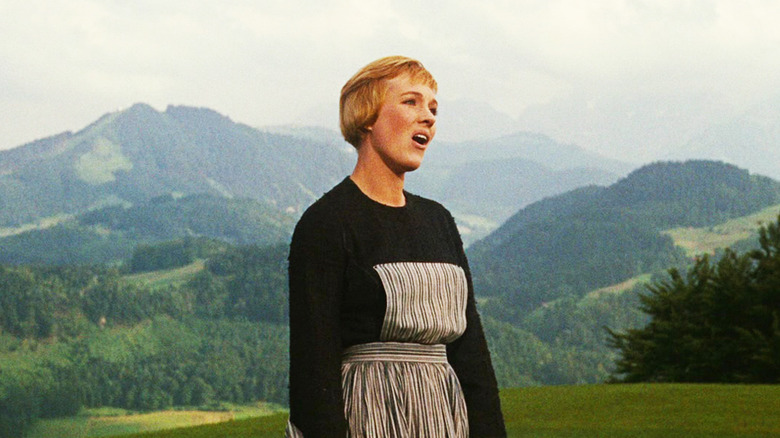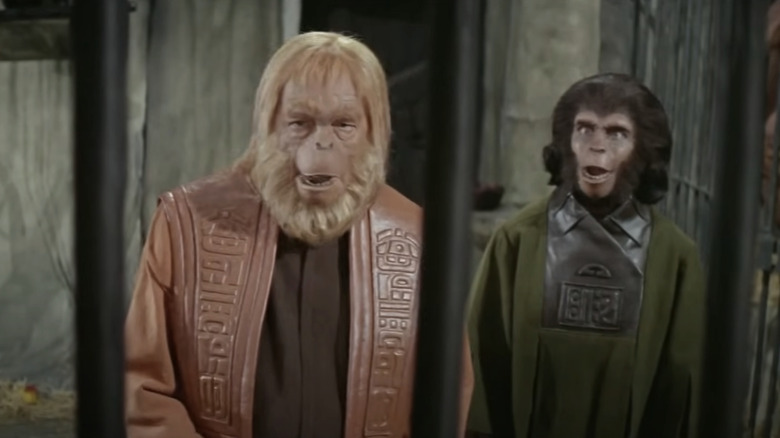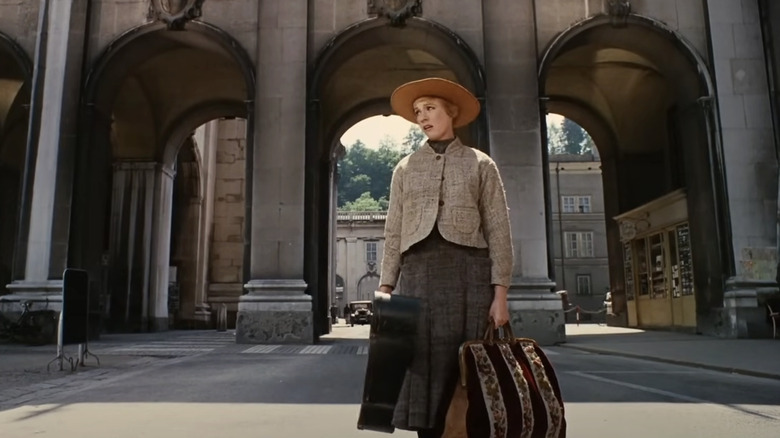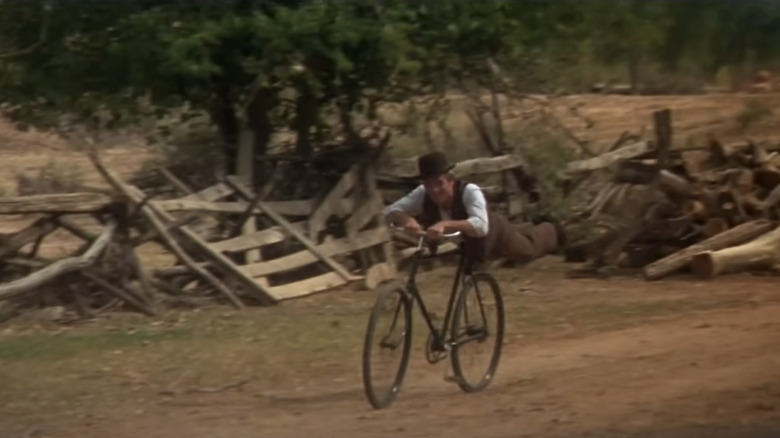Fox Desperately Tried To Save Its Studio By Selling Now-Priceless Props
Long before the Disney/Fox merger of 2019 created 20th Century Studios, there was 20th Century Fox. One of the original big five studios, 20th Century Fox was founded as 20th Century Pictures in 1935 by Joseph Schenck and Darryl F. Zanuck. The latter of the two was a former Warner Bros. executive and noted pervert, who, as The Daily Beast has pointed out, was one of the chief architects of the notorious casting couch culture that produced so much of the murk in which golden age Hollywood operated. But despite what The New York Times has described as his "well documented" proclivity for flashing women, he also seemed to be pretty good at running a studio — at least for most of his career.
One particular aspect of his personality that helped in that regard was his attention to detail, as described in Scott Eyman's 2021 book "20th Century Fox — Darryl F. Zanuck and the Creation of the Modern Film Studio." It was Zanuck's fastidiousness that led him to zero in on Gregory Peck's mustache for "The Gunfighter," which the exec claimed he would have paid $25K to shave as it was, in his estimation, almost solely responsible for the 1950 Western's lackluster box office performance. That said, the studio head was out of the country when the film was being shot, so what good is attention to detail if you're not around to use it?
Otherwise, Zanuck had a pretty good run as the first head of 20th Century Fox, casting his discerning eye across the company even after leaving in 1956 and being granted a contract that still allowed him a say over casting and directing choices. However, Zanuck would soon return to the studio, only to oversee the sale of several Fox props as the studio ran into financial troubles.
20th Century Fox faced economic issues in the 1960s and 70s
After 20th Century Fox experienced financial woes under President Spyros Skouras, Zanuck returned to try to right the ship, installing his son, Richard, as head of production. Zanuck Jr. initially seemed to be exactly what Fox needed, shepherding such hits as "The Sound of Music" and "Planet of the Apes" (which is still the best of the "Planet of the Apes" films). But it wasn't enough to save the studio from teetering on the verge of bankruptcy by the end of the '60s — especially since Richard's run of success didn't last. Darryl Zanuck wasn't exactly helping either with his 1970 war epic "Tora! Tora! Tora!," which made a decent $29.5 million at the box office but was considered a disappointment as it hadn't broken even by the time it left theaters. It eventually paid for itself in home video sales, but breaking even wasn't going to restore 20th Century Fox to economic prominence.
By the beginning of the '70s, things were looking fairly dire for Zanuck, as Scott Eyman details in "20th Century Fox":
"Economies became drastic. All wrap parties had to be paid for by the producer or director, not charged to the studio. Likewise, since night screenings in New York were pricey, they were canceled unless they were at the request of Darryl Zanuck. Richard suggested selling the Fox TV station in Minneapolis, even though it was profitable, because he thought it would decline in value 'with the ultimate increase in cassette viewing.' Cassettes wouldn't become ubiquitous for ten more years, but would not negatively impact the value of TV stations."
Instead of listening to his son, Zanuck Sr. pushed ahead with his own agenda, which ultimately saw him forced to hold the studio equivalent of a yard sale.
Discussions begin about selling 20th Century Fox's props
After failing to restore 20th Century Fox's fortunes, and failing to successfully recruit Akira Kurosawa in the process with "Tora! Tora! Tora!," Darryl Zanuck had to consider other options. According to Scott Eyman's book, this included potentially selling off props from the studio's vast collection. By the end of the '60s, Fox had amassed 25 years-worth of props, which were stored in a three-story warehouse that, as Eyeman puts it, "covered most of a city block." The author writes:
"Not surprisingly, Darryl Zanuck was against it: 'WE SHOULD HOLD OFF ON ANY SALE OF PROPS AT THIS TIME,' he telegraphed Richard. 'I KNOW WE COULD USE THE MONEY BUT THE LONGER WE WAIT THE MORE WE CAN GET FOR THEM. HOWEVER MY BASIC REASON IS THAT IT WILL BE PICKED UP BY THE PRESS AND IT WILL GIVE THE OPINION THAT WE ARE REALLY SCRAPING THE BOTTOM OF THE BARREL.'"
But in truth, Fox was fast approaching the bottom of said barrel, and Zanuck started to worry about his own position as head of the studio. As Eyeman writes, "once you started selling pieces of a studio, the economies might extend to jettisoning a certain elderly chairman." This self-concern led Zanuck Sr. to fire his son in 1970 (the younger Zanuck was fine, he went on to produce multiple hits such as "Jaws" and celebrated features such as 1989's Oscar-winning "Driving Miss Daisy"). It was a bold move and an (ultimately unsuccessful) attempt to save his own job. Nevertheless, it didn't work, and the props went up for sale anyway.
Fox's prop fire sale
As recounted in "20th Century Fox," the props that Darryl Zanuck was so eager to hold onto were eventually sold. In February 1971, 2,000 pieces were auctioned off, including Paul Newman's bicycle from "Butch Cassidy and the Sundance Kid," which fetched $3,000. Julie Andrews's gros point roses carpetbag from "The Sound of Music" — a film Richard Zanuck had overseen all the way to its Best Picture win — netted the studio $650. All in all, the prop sale brought in $365,480 for the struggling 20th Century Fox, which in 2024 equates to around $2.8 million.
Of course, Zanuck Sr. was right when he said "the longer we wait the more we can get for them." But in the early '70s, the studio didn't have time to spare. What's more, firing his son and holding the prop sale did little to preserve Zanuck's tenure. Just as the studio president had feared, these two events really had signaled to others that 20th Century Fox was scraping the bottom of the barrel, despite attempts to make things appear otherwise. As Eyman writes:
"The studio tried to counter the fire-sale atmosphere by pointing to the Best Picture win of 'Patton,' and to the fact that two of their pictures –- 'The Panic in Needle Park' and 'Walkabout' –- were invited to the Cannes Film Festival. It didn't seem to help."
In April of '71, a dissident group of the studio's stockholders forced Zanuck to resign. The day after he left, The New York Times noted the "staggering financial losses" faced by 20th Century Fox, but proclaimed Zanuck to be "the last remaining tycoon of Hollywood's golden era." However, by that point, stockholders saw the aging "tycoon" as little more than an old prop himself.



